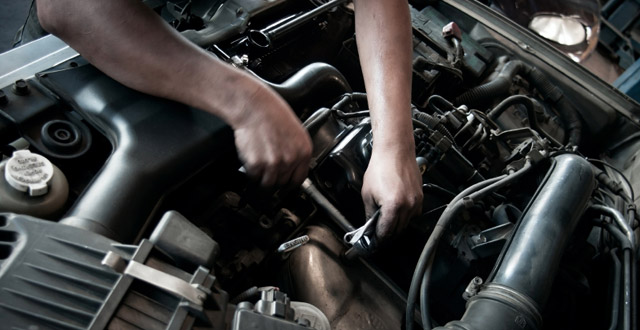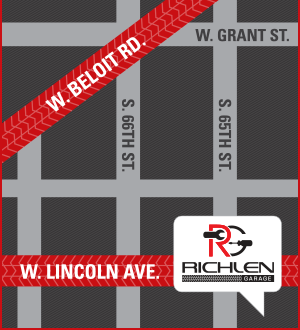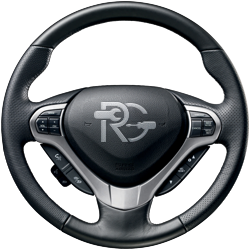Results speak for themselves. Richlen Garage has 65 years experience specializing in complete auto repairs in West Allis, WI serving the greater Milwaukee area. Customers have been bringing their automobiles in for service for generations, trusting their vehicles to the knowledgeable staff. Along with being an A+ business with the Better Business Bureau, Richlen Garage has also received the Super Service Award from Angie's List several times.
![]()
Q: Because you have so many high-tech gadgets, is it as simple as plugging your vehicles computer in to tell you what's wrong?
A: This couldn't be further from the truth! Modern vehicles are some of the most complex instruments that you could imagine. From the drive train to the complex safety systems there are massive amounts of engineering under the hood of today's vehicles. While it is true that technicians do utilize tools that plug into your vehicles diagnostic connector, the data received is typically a series of clues that lead the technicians to the actual problem. Because of the complexity of today's vehicles, diagnostic techniques have evolved alongside of the vehicles. Richlen Garage has invested greatly in continuing education and equipment to keep pace with the evolving vehicles on the market.
![]()
Q: How does Richlen stay current with today's automotive repair advances and techniques?
A: Richlen Garage employees are dedicated to continuing education and have invested time and resources into schooling, certifications and technology that keep them at the forefront of the automotive repair industry. These courses have included:
- Asian Vehicle Drivability Data Analysis
- Engine Mechanical testing with Electronic tools
- Advanced Scope Testing Techniques
- Ford Engine management system part 1, and 2
- GM engine management systems part 1 and 2
- Toyota engine management systems
- Chrysler engine management system
- Pcm bus communications
- Drivability data analysis
- Displacement on demand diagnostics
- Ford Pats and GM passkey 3 theft deterrent diagnostics
- Pc aided diagnostics
- Key off evap system advanced diagnostics.
- Asian OBD2 eap system diagnostics
![]()
Q: What does it mean to have an Intermittent Problem?
A: When a vehicle has a problem that occurs unpredictably it is called an intermittent problem. How many times does your car do something and you can't seem to make it happen when you bring it to the shop? That is what is called an intermittent problem and diagnosing problems like these are very difficult by nature. Richlen's advanced diagnostic equipment and decades of experience searching out problems allow them to better diagnose these hard to find issues, often resulting in a large cost-savings.
![]()
Q: Why does my vehicle "run good" when my check engine light in on?
A: The check engine light comes on because the engine computer monitors all the systmes constant and can act as an early warning when a failure is going to occur. The vehicle engine computer is capable of compensating for unknown problems/lack of maintenance; however, this has its limitations. Several systems i.e.: the Catalytic Converter Efficiency Monitor and the Evaporative Emission Monitor will not cause any drivability problems if they fail and the check engine light comes on.
An example of a future component failure is when a sensor falls out of range, but has not totally failed.
![]()
Q: Why did my vehicle pass emissions test and my "check engine" light came on?
A: An emissions test is a "test in time" that samples the tailpipe exhaust. That is very different than an engine computer that continuously runs self-tests virtually from start up until the engine is turned off.
![]()
Q: What can I do to avoid expensive OBD II repairs?
A: A good starting point would be to do the vehicle manufacturers minimum maintenance. An example of the importance of vehicle maintenance would be to not replace a fuel filter at the recommended interval, causing the filter to become restricted. Pumping fuel through a partially plugged filter may result in a premature pump failure. Running a gas tank low will also wear out a pump early.
A dash warning light must be diagnosed as soon as possible. When a dash warning light comes on this is an indication that a system has failed. Since the OBD II systems are integrated and all influenced by each other, a failed system gives cannot carry a command from the engine computer. This failed system can also adversely affect the other related OBD II systems.
![]()
Q: Do spark plugs really last for 100,000 miles?
A: The good news: Spark plugs will last 100,000 miles IF everything else is ok; however, should you have a failure such as a fuel pressure regulator; the spark plug life is greatly diminished. The bad news: Spark plugs probably won't come out of the engine at 100,000 miles. Spark plug threads are steel. The engine head is aluminum. Dissimilar metals tend to "weld" themselves together over a long period of time. If you force them out, the treads will be wiped out of the aluminum engine head. Threads cannot be restored while the engine head in in the car. Removing the head and sending it to the machine shop is far more expensive than replacing the spark plugs at a lower mileage interval.
![]()
Q: Why does Diagnosing OBD II cost so much more? When you "plug in" doesn't it tell you what's wrong?
A: OBD II has hundreds and hundreds of fault codes. These fault codes only tell you an area to pinpoint test. OBD II is a very refined computer management system. OBD II is so complex, often a fault code for one system is actually that system reacting or compensating for another system with a problem.
Many of the engine running problems' root causes are from a component or devise that has failed for a moment in time. For technology this sophisticated, the correct diagnosis requires duplicating and capturing the root cause at that exact moment in time.
![]()
Q: Why do you need my vehicle for such a long period of time when I bring it in for running problems regarding my vehicle's OBD II System?
A: Because the "running problem" has to be caught happening with the correct pinpoint diagnostic equipment connected. The technician has to have time to provide an accurate diagnosis. It is often stated that in the latest computer technology, diagnosing the problem takes 80% of the time while the repair is only 20% of the time.
![]()
Q: How do I know the repair your shop performed corrected my vehicle's problem?
A: A print out before and after the repair helps to remove any doubts customers may have. We at Richlen Garage have 65 plus years of dedicated service to the Milwaukee and West Allis community and believe in honest and fair service each and every time.
Print out or not, the OBD II monitors will run self-tests after the repair. Your shop may have to rad test after rapiers and have the vehicle's computers run the monitors self-test before the vehicle is returned to the customer as well.













